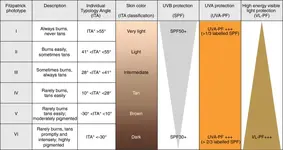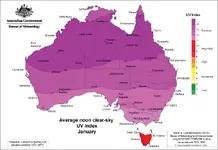This post is split into 3 topics.
Topic 1: Sun Exposure
So much of this debate is dependent on individual complexion, latitude and climate. A Swede in Sweden can go to the beach for an hour in the summer without sunscreen and he'll have no negative consequences. A Swede vacationing in Cancun on the other hand might get destroyed in just 30 minutes.
If you live in a latitude and climate similar to your "native" region, sunscreen is only worth worrying about for long exposure times. For short walks outside it's not a risk factor and any benefit from the sunscreen will be outweighed by the chemicals leeching into your skin.
^ This is an important factor when deciding what approach to use.
There is no single guideline for minutes per day of exposure.
Sun exposure plays an essential role in human health, but must be tailored to the individual to maximize health benefits and avoid burning. Be sure to determine your skin type and the UV Index in your area to assess and personalize your sun exposure.
Intro to the topic of sun exposure:
There are two conflicting views on sun exposure. On the one side are dermatologists, skin cancer organizations and public health groups who have been advising the public to stay out of the midday sun, or to use sunscreen, daily, to reduce the risk of skin cancer. On the other side are vitamin D advocates, scientists and doctors who believe that sensible, non-burning sun exposure helps you achieve adequate vitamin D levels, which reduces your risk of a number of serious diseases without increasing your risk of skin cancer.
Many studies with firm conclusions are still restricted for generalisation due to geographical x skin prototype interaction effects. Beware studies that do not account for these factors.
Most important, it seems, is to understand the relative contribution of the following to
your unique, personal situation.
This meta-framework is partially informed by the model from
'The Relation between Sunscreen and Skin Pathochanges Mini Review' (p 47)
[PDF:
https://www.academia.edu/download/31719246/I0271043052.pdf]

GENETICS
1. Your parental genetics, including skin prototype and skin-related issues.
2. Your skin prototype
3. Your history of childhood burns, sunspots
4. Your skin type - dry, oily etc
5. Hints from the skin prototype of the oldest "natives" of your region
TIMING and LOCATION
6. The season of exposure
7. Cloud cover
8. The time of day of exposure
9. Longitude/latitude and climate including UV intensity
The absolute best time to get sunlight is the first thing in the morning. I try to do this
every day. For many reasons:
If the UV is high... then the second best is just after breakfast. Third best is just before sunset. For most fair-skinned individuals, assuming the UV is high at midday, it is best to avoid *long* sun exposure within a couple of hours of the celestial meridian in your area and depending on the time of year.
The above may only apply **IF** you are light skinned and do not need additional Vitamin D and do not live in Canada etc. Then you will need more exposure and exposure during the middle of the day:
It’s the UVB rays in ultraviolet light that makes vitamin D in your skin. Sunshine at midday in summer is typically composed of 95% UVA and 5% UVB. The small amount of UVB is all it takes to make vitamin D in your skin. This occurs when the UV index is above 3 and your shadow is shorter than your height. During spring/summer the best time to make vitamin D is between 10 am and 2 pm. During the fall/winter months UVB rays do not reach the earth above a latitude of roughly 34 degrees (Los Angeles, CA and Atlanta, GA), so much of the United States and Canada enters a “vitamin D winter” where no vitamin D will be made, regardless of the time of day.
If you live in say, Canada during a long dark winter, a
light box may be useful:
^
note: This is an example and not a recommendation for this particular product.
ENVIRONMENT
10. What other non-medicinal protection you are using: protective clothing, long-sleeved shirt, a wide-brimmed hat, sunglasses with UV protection etc.
11. Environmental conditions: full shade, the tinting of your car windows, etc.
DRUGS, DIET etc
12. Other moderating factors such as drug-induced photo-sensitivity* allergens, diet, skin care, general health, etc.
*
https://www.ncbi.nlm.nih.gov/pmc/articles/PMC7898394/
Drug‐induced photosensitivity, the development of phototoxic or photoallergic reactions due to pharmaceuticals and subsequent exposure to ultraviolet or visible light, is an adverse effect of growing interest. This is illustrated by the broad spectrum of recent investigations on the topic, ranging from molecular mechanisms and culprit drugs through epidemiological as well as public health related issues to long‐term photoaging and potential photocarcinogenic consequences. The present review summarizes the current state of knowledge on the topic while focusing on culprit drugs and long‐term effects. In total, 393 different drugs or drug compounds are reported to have a photosensitizing potential, although the level of evidence regarding their ability to induce photosensitive reactions varies markedly among these agents. The pharmaceuticals of interest belong to a wide variety of drug classes. The epidemiological risk associated with the use of photosensitizers is difficult to assess due to under‐reporting and geographical differences. However, the widespread use of photosensitizing drugs combined with the potential photocarcinogenic effects reported for several agents has major implications for health and safety and suggests a need for further research on the long‐term effects
CULTURE AND SOCIAL INFLUENCE
13. For instance, will your friends say "you look gay" if you have a pasty white coat of zinc sunscreen on your cheeks while wearing a labourers' hat?

Will you care?
 Re: skin prototypes
Re: skin prototypes, this can make a HUGE difference to the impact of sun exposure and importance or unimportance of sunscreens
The current research suggests that distinct prototypes exist across a range of sun‐related behaviours and that the prototype willingness model may provide a useful framework for further exploration of incidental sun exposure.
An example chart for reference:

This is what the older "natives" look like in my area
Compared to those with my common Anglo-Celtic ancestors
And then, here is the eye-watering summertime (January) UV index -

Compare this to Winter (June) -

The patterns of average monthly clear-sky UV Index largely follow latitude lines with the highest values generally in the north of the continent and the lowest in the south. The Index reaches a peak in January when average values of 11 or more cover virtually all of Australia. These values are clear-sky values only, conditions would otherwise be somewhat tempered by the cloudiness associated with the monsoon in the north. The lowest values occur in June-July where the UV Index averages less than 2 over Tasmania, increasing to almost 8-9 in far northern Australia. It is the varying intensity of solar radiation and ozone throughout the year that mostly accounts for this variation of the UV Index which is evident on the monthly and seasonal maps
The genetics x location interaction explains, in part, why people of Celtic background living in Northern Australia have extremely high rates of skin cancer and skin issues. Few other places have such a disparity between native and non-native skin.
Topic 2: Sunscreens
Mineral oil sunscreens are okay, though the chalky residue they leave is just awful looking. Some chemical sunscreens may be okay too, but as a rule of thumb anything over SPF 25 is likely to be more harmful as they use more insane ingredients. You don't really need an SPF over 25 anyway. Personally I just opt to wear sunhats and protective clothing for the most part, though there are a few brands I use.
This website is very helpful for identifying the safety of specific products.
https://www.ewg.org/skindeep/
Nice find.

This is a useful website. In addition to providing specific product information, you can input ingredients here:
An overview of the two main types of sunscreens:
The problem of most sunscreens is that the chemical ingredients can be absorbed into and underneath your skin, and have further consequences for your health, fertility etc. See Table 1 here:
For instance, Oxybenzone is a popular ingredient that is "safe" according to the following MSM website:
But, digging deeper, the evidence is worrying
The most worrisome sunscreen active ingredient is oxybenzone, according to publicly available scientific research. It is readily absorbed through the skin and the Centers for Disease Control and Prevention found higher levels of oxybenzone in those who report applying sunscreen. It causes allergic skin reactions, behaves like a hormone disruptor and may be more harmful to children as they are more susceptible to the effects of chemicals.
From what I can see (readers, feel free to prove me wrong, I would love to be wrong about this)... there is no "natural" skin care that provides both the lack of side effects and the strong sun protection of chemical sunscreens.
The best sunscreen I can see that balances both protection and minimal side effects is something like the following:
Some counterpoints to the above video on DIY here:
Lotion based zinc oxide seems essential in this mix. That said, "Non-nano zinc oxide" seems best but is not easy to verify with most lotions.
Unfortunately, manufacturers do not currently have an obligation to label particle size on sunscreens, making it difficult for consumers to identify sunscreens that do contain nanoparticles. The only method of reliably avoiding nanoparticle-containing sunscreens would be to choose a sunscreen containing only organic ‘chemical’ filters.
[
https://www.racgp.org.au/afp/2016/june/the-safety-of-nanoparticles-in-sunscreens-an-update]
Zinc oxide appears better than anything with Oxybenzone for example, but may still pose potential dangers.
The Therapeutic Goods Administration’s (TGA’s) Literature review on the safety of titanium dioxide and zinc oxide nanoparticles in sunscreens6 and the European Commission’s Scientific Committee on Emerging and Newly Identified Health Risks’ (SCENIHR’s) Risk assessment of products of nanotechnologies7 concluded that the evidence at the time of publication did not suggest that TiO2 and ZnO nanoparticles reached the general circulation. The TGA’s publication concluded that current evidence suggests these particles remain within the non-viable, keratinised cell layer of the stratum corneum and that short-term, in vivo studies did not demonstrate harm to human cells.6
These findings are in direct contrast to a previous study published in 2010 by Gulson et al, which found increased amounts of zinc in the blood and urine of human trial participants after a five-day application of sunscreen containing ZnO nanoparticles.8 Of concern, the concentration excreted peaked at nine days post-application, for reasons unable to be explained by the researchers.
One last tip:
Choose lotions and sticks over sprays. These popular products make it difficult to apply an adequate and even coating on skin, especially in windy conditions. They also pose inhalation concerns.
This is especially important for Zinc Oxide. Do not use any Zinc Oxide spray due to the risk of inhalation:
There are also limits to sunscreen use; light-skinned people using sunscreen all day because they intentionally want to get sun exposure, and think they are protected, may not be as protected as they think they are:
Once your personal threshold in the sun has been reached, sun protection should be used; this may take the form of going indoors, seeking shade, covering up, or applying sunscreen. While many government agencies recommend always using sun protection, such as daily sunscreen use, this is a mistake according to Dr. Robert Heaney. He states that while sunscreen can be helpful in protecting the skin from burning, sunscreen manufacturers have a vested interest in scaring us into using more of their product.
In this whole discussion, I think considering the mammoth influence of the beauty-chemical-industrial complex is important, no matter your take on the sunscreen issue
Topic 3: Youth and Beauty
...Still extremely easy to get my vitamin D through the arms or legs if I'm wearing shorts. Never had any vitamin D issues in my life. On the other hand, girls half my age think I'm the same age as them.
Other guys need to go half-way around the world to attract younger women. I just wear sunscreen and save myself the hassle. My wife will be significantly younger than me, anywhere from 8-20 years, because I take care of my health. Health is beauty. Being healthy = being beautiful. It's that simple and I couldn't care less what anyone thinks because this is objectively true.
And yes obviously women are attracted to more than looks. But if you're someone who looks like a guy their own age, but with decades of extra knowledge, experience, and resources, it's incredibly easy to crush the competition.
^ IMO, some important topics here for older guys who want younger women in their life.
In contrast, some men here clearly have a distaste for maintaining appearances, especially when it comes to attracting women. To some extent I absolutely agree, in that, fixating over one's own appearance is the realm of women and homos.
Ultimately, I think
it's up to the individual to determine if the meaning and utility attached to their goals
justifies the cost undertaken and the effort needed to reach these said goals.
I have a post on this in the works. In summary:
The ideal aim of the suggested youth-giving endeavours (such as working out, skincare, eating well, avoiding *excessive* sunlight, etc) is
first, to make you feel great and improve your confidence and your health; and
second, for you to be more attractive to women.
Unless a man wants to rely on money, materials, and status alone as leverage to get younger women (which puts them at risk of becoming a walking ATM, resource extraction device, and unseen social media photographer)... this is one critical key to being attractive to much younger women and maintaining the relationship:
Cultivating a
look of youth, positive
upbeat energy, and ongoing proactive commitment to
health... that together give you a
genuine feeling of being younger than your biological age.
Given this is getting further off topic but is highly relevant to the single readership, I will post it in a 'courting' thread later for older guys who want to be with younger women.
I hope this post has been of use. Feedback welcome as always.






